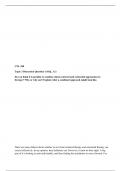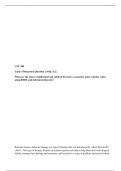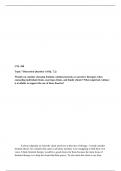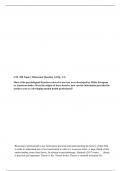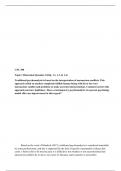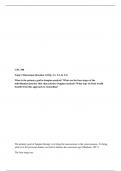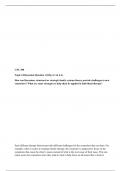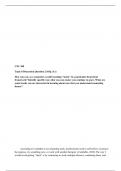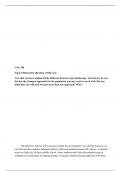Grand Canyon University
Your school or university
Improve your search results. Select your educational institution and subject so that we can show you the most relevant documents and help you in the best way possible.
Ok, I understand!
CNL 500: Theories and Models of Counseling
NRS429 Week 3
Relias Dysrhythmia Basic A
- NRS 410v
-cwv-101
:: PSY-255
.PSY550-Research Methods
03 0506 Products Overview
103 0506
2019 HESI EXIT V5
2022 CIGNA Selling with Integrity Test.
2022 HESI RN EXIT
2022 HESI RN EXIT V1
2022 HESI RN EXIT V1 WITH COMPLETE SOLUTION(A LEVE
2022 HESI RN EXIT V3
2022-2023 HESI OB Maternity V1
2023 wellcare
2023 Wellcare Medicare Certification
360 ANSI training
AA 1
Abnormal Psychology
Abnormal Psychology Qui
AC 240
ACC 616
ACC - Managerial Accounting
ACC 201/202
ACC 205
ACC 240
ACC 240 Topic 2 DQ 1
ACC 240 Topic 2 DQ 2
ACC 240 Topic 4 DQ 1
ACC 240 Topic 4 DQ 2
ACC 240 Topic 5 DQ 2
ACC 240 Topic 6 DQ 1
ACC 240 Topic 6 DQ 2
ACC 240 Topic 7 DQ 1
ACC 240 Topic 7 DQ 2
ACC 291 FI 101
ACC 350
ACC 350 - Managerial Accounting
ACC 350 - Managerial Accounting Quiz 6
ACC 350 Final Exam
ACC 350 Topic 6 Quiz with Answers
ACC 502
ACC 502 Topic 1 DQ 1
ACC 502 Week 2 Discussion 1
ACC 502 Week 2 Discussion 2
ACC 502 Week 3 Discussion 1
ACC 502 Week 3 Discussion 2
ACC 502 Week 4 Discussion 1
ACC 502 Week 4 Discussion 2
ACC 502 Week 5 Discussion 1
ACC 502 Week 5 Discussion 2
ACC 502 Week 6 Discussion 1
ACC 502 Week 6 Discussion 2
ACC 502 Week 7 Discussion
ACC 502 Week 7 Discussion 1
ACC 502 Week 8 Discussion 1
ACC 502 Week 8 Discussion 2
ACC 616
ACC 622
ACC 622 Topic 1 DQ 1
ACC 622 Topic 1 DQ 2
ACC 622 Topic 2 DQ 1
ACC 622 Topic 2 DQ 2
ACC 622 Topic 3 DQ 1
ACC 622 Topic 4 DQ 1
ACC 622 Topic 5 DQ 1
ACC 622 Topic 5 DQ 2
ACC 622 Topic 6 DQ 1
ACC 622 Topic 7 DQ 1
ACC 622 Topic 7 DQ 2
ACC 622 Topic 8 DQ 1
ACC 622 Topic 8 DQ 2
ACC 650
ACC 650 Accounting Assignment Help
ACC 650 Topic 1 Discussion GCU
ACC 650 Topic 2 Discussion GCU
ACC 650 Topic 3 Discussion GCU
ACC 650 Topic 4 Discussion GCU
ACC 650 Topic 5 Discussion GCU
ACC 650 Topic 6 Discussion GCU
ACC 650 Topic 8 Discussion GCU
ACC 653
ACC 667
ACC 667 Topic 1 DQ 1
ACC 667 Topic 1 DQ 2
ACC 667 Topic 3 DQ 1
ACC 667 Topic 3 DQ 2
ACC 667 Topic 4 DQ 1
ACC 667 Topic 5 DQ 1
ACC MISC
ACC-350
ACC-350 Final Exam
ACC-350 Final Exam TRISH DO
ACC-350 Topic 6 Quiz
ACC-350 Topic 6 Quiz Trish Do
ACC240
acc350
Accounting Practice
ADHD/Substance Abuse/Child Abuse/Elder Abuse
ADM 614
adm 624
ADM 624 Week 2 Assignment Case 3.1, The Katrina Breakdown
ADM 624 Week 3 Assignment Case 5.1 A Strategy is Born
Advanced Assessment Interpreting Findings And Formulating Differential Diagnoses
Advanced Assessment
Advanced Assessment 4th Edition Goolsby TB
ADVANCED ASSESSMENT: INTERPRETING FINDINGS AND FORMULATING DIFFERENTIAL DIAGNOSES 4th Edition, Mary Jo Goolsby, Laurie Grubbs
ADVANCED CASE MANAGEMENT FOR ADDICTION
Advanced Nursing Practice
ADVANCED P NURS - 6501N
Advanced Pathophysiology
Advanced Pharm 100% co.rrect
Advanced Practice Nursing
Aetna
Aetna 103 0506
AGNP Board
AHA ACLS
All PQ\\\'s
American Red Cross First Aid
AMP 425
AMP 450V
AMP 450V: Leadership And Vocation
Anatomy & Physiology
Anatomy of Orofacial Structures
Animal Physiology
ANP 650
Answered -PHY 102
Anthropology
Applied Statistics
Arizona and Federal Government
Assignment 2.1: Important Factors for HIT Strategy
ATI
ATI - Adult Med-Surg Critical Care
ATI - Mental Health
ATI -Medsurg Respiratory Questions
ATI Abdomen Notes
ATI CMS FUNDAMENTAL
ATI COMPREHENSIVE EXIT
ATI MATERNAL NEWBORN
ATI Pharmacology
ATI Pharmacology Midterm
ATI RN
ATI Safe Dosages
ATI Teas
ATI Teas 6 - Science
ATI TEAS 6 –Math
ATI TEAS 7 SCIENCE
ATI TEAS 7 - English & Language
ATI TEAS 7 MATH
ATI TEAS 7 maths
ATI TEAS 7 SCIENCE
ATI-Community Health
ATI-Medical Surgical-Critical Care
ATI-Medical-Surgical B
ATI-Medical-Surgical Cancer & Oncology
ATINutritionProct
ATP-214
ATP-401
ATP-402: Pharmacology and Advanced Therapeutic Interventions
Basic Immunology
becoming a college writer Eng 105
Behaviour
Benchmark - Effective Approaches in Leadership and Management
Benchmark - Nursing Process
Benchmark__Population_Health_Policy_Analysis
Benchmark-Capstone Project Change Proposal for Nursing Burnout and Mental Fatigue College of Nursing and Health Professions, Grand Canyon University NRS-493VN Professional Capstone and Practicum August 2021
Benchmark-Capstone Project Change Proposal Marina Michelle Bragasin Grand Canyon University NRS-493 Professional Capstone July 26, 2020
BHS 430
BHS-330
BIB 106
BIB 106 EXAM 2 Encountering the Old Testament CHAPTERS 10-15 and 19-23
BIB 106 Exam 3
BIB 106.
BIB 107
BIB 108
BIB-106 EXAM 1
BIB-106 Topic 1 Review
BIB-106.
BIB-107
BIB-107: Exam #3 – Take-home Final
BIB-107.
BIO 133
BIO 181
BIO 181L
BIO 182
BIO 201
BIO 210
BIO 210L
Bio 220
BIO 220 ENVIRONMENTAL SCIENCE
BIO 220 RS Online Scavenger Hunt For Success Resource
BIO 299
BIO 319
BIO 320
BIO 333
BIO 457
BIO-201
BIO-202
BIO-205
BIO-220
BIO-220 Environmental Science
Bio-319 Midterm Study guide Chapters 1-6
BIO-322 Applied Pathophysiology
BIO220
BIO319 midterm review
BIO322
Biochemistry
BIOL 202
BIOL202
Biological Psychology
Biology
BIOLOGY 1406
BIOLOGY 201
BIOLOGY 201 Topic 2 quiz 1
Biome And Ecosystem Essay
BIOS 252 Midterm Exam Essay Question
BIOS 252 Midterm Exam Study Guide
BIOS 255
BLS
Boards Study Guide:Exam: Practice And Preparation
botany
BSA IGNMENTWEEK 5 ASS
bsn
BUS 311
BUS 340
BUS 485
BUS 660
BUS1002
Busi 3250
BUSI 340
BUSINESS
Business 100 Final Exam
BUSINESS 1011
BUSINESS MANAGEMENT
BUSINESS UNV-504 Introduction to Graduate Studies
CAE 123
Calculate with Confidence
calculus
Calculus-Applied Approach
CAPSTONE MED SURG ASSESSMENT
Capstone Project Change Proposal
CARDIOVASCULAR DISEASES
Cardiovascular Problems of the Adult Client
Care of Infants and Children
CAROLYN CROSS CASE STUDY 41-YEAR-OLD FEMALE
Case Study on Death and Dying
CCNA 2 CHAPTER 9 V5
CCRN Critical Care
CCRN Critical Care Register Nurse
CCRN Critical Care Register Nurse EXAM
CHEM 113
Child Abuse
CHM 115
Christian Worldview
CIGNA Selling with Integrity
CNL 500
CNL 500: Theories And Models Of Counseling
CNL 505
CNL 509
CNL-500
CNL-520
COM 263
COM 312 dq 2
COM 362
COM 362 Argumentation and Advocacy
COM MISC
COM- 100 (100-O
COM-355
COM362
COM362 Argumentation and Advocacy
COM362 Week 4 Assignment Reading Exercise Latest 2020 with solutions Grand Canyon University
COMMUNITY AND ANALYSIS PRESENTATION
Community and Public Health Nursing
Community Assessment and Analysis Presentation NAME GCU: NRS-428VN-0501- Concepts in Community and Public Health
Community Teaching Plan: Teaching Experience Paper NRS-428VN
Community Teaching Work Plan Proposal
Complete AIN2601 Assignment
Complex Adult Health NR-341
Comprehensive ATI Practice 2020-2021-LATEST
Comprehensive Form A
Comprehensive NCLEX
Congenital Heart Defect NextGen SKINNY Reasoning
Contemporary Nutrition
CONTINOUS INTERGRATION
Course: CWV-101 (Tompkins_CWV_101_RS_T5Gospel_Esse
Critical Care Nursing
Critical Care Nursing-Diagnosis and Management
Crucible Act III
CST-210
Cultural Assessment Project Announcement
Curriculum and Instruction
CVW 101
CWV -101
CWV 101
CWV 101 Class Final Exam With Answers
CWV 101 Final Exam
CWV 101 Final Exam Questions And Answers Grand Canyon University
CWV 101 FinQsAnd Ans 2022.
CWV 101 Topic 1
CWV 101 Topic 1 Quiz Questions And Answers. Grand Canyon University
CWV 101 Topic 2
CWV 101 topic 2 Quiz.
CWV 101 Topic 3
CWV 101 Topic 3 Quiz. Questions And Answers. Grand Canyon University
CWV 101 Topic 3 Quiz. Questions And Answers. Grand Canyon University.
CWV 101 Topic 4
CWV 101 Topic 4 Review Study Guide
CWV 101 Topic 5 Quiz
CWV 101 topic 5 Quiz.
CWV 101 Topic Quiz 1.
CWV 301
CWV 301 Topic 4 quiz
CWV 301 Topic 5 Quiz
CWV-101
CWV-101 0500
CWV-101 Final Exam Study Guide
CWV-101 ORIGINS ASSIGNMENT
CWV-101 Q3
CWV-101 Topic 6 Study Gui Already Passed
CWV101
CWV301
Data Analysis
DCPO
Death and Dying
Delegation and Management
Diabetes Medical Surgery
DNP 805
DNP 501
DNP 801
DNP 801 Topic 1 DQ 2
DNP 801 Topic 2 DQ 1
DNP 801 Topic 2 DQ 2
DNP 801 Topic 3 DQ 1
DNP 801 Topic 3 DQ 2
DNP 801 Topic 4 DQ 2
DNP 801 Topic 5 DQ 1
DNP 801 Topic 5 DQ 2
DNP 801 Topic 6 DQ1
DNP 801 Topic 6 DQ2
DNP 801 Topic 7 DQ 1
DNP 801 Topic 7 DQ 2
DNP 801 Topic 8 DQ 1
DNP 801 Week 4 DQ1
DNP 805
DNP 805 : Health Care Infomataics
DNP 805 : Health Care Infomatics
DNP 805 Topic 1 Discussion 1
DNP 805 Topic 1 Discussion 2
DNP 805 Topic 2 Discussion 2
DNP 805 Topic 3 Discussion 1
DNP 805 Topic 3 Discussion 2
DNP 805 Topic 4 Discussion 1
DNP 805 Topic 5 Discussion 1
DNP 805 Topic 5 Discussion 2
DNP 805 Topic 6 Discussion 1
DNP 805 Topic 7 Discussion 1
DNP 805 Topic 7 Discussion 2
DNP 805 Topic 8 Discussion 1
DNP 810 Ethical And Legal Consideration - The Knowledge Levels of Hypertension among Faith-Based of African-American Men
DNP 810 Genetics counselling
DNP 825
DNP 825 Topic 1 Discussions 1 GCU Nov 2021
DNP 825 Topic 1 Discussions 2 GCU Nov 2021
DNP 825 Topic 2 Discussions 1 GCU Nov 2021
DNP 825 Topic 2 Discussions 2 GCU Nov 2021
DNP 825 Topic 3 Discussions 1 GCU Nov 2021
DNP 825 Topic 3 Discussions 2 GCU Nov 2021
DNP 825 Topic 4 Discussions 1 GCU Nov 2021
DNP 825 Topic 4 Discussions 2 GCU Nov 2021
DNP 825 Topic 5 Discussions 1 GCU Nov 2021
DNP 825 Topic 5 Discussions 2 GCU Nov 2021
DNP 825 Topic 6 Discussions 2 GCU Nov 2021
DNP 825 Topic 6 Discussions1 GCU Nov 2021
DNP 825 Topic 7 Discussions 1 GCU Nov 2021
DNP 825 Topic 7 Discussions 2 GCU Nov 2021
DNP 825 Topic 8 Discussions 1 GCU Nov 2021
DNP 825 Topic 8 Discussions 2 GCU Nov 2021
DNP 825 Week 8 Assignments Topic 8 DQ 1
DNP 825 Week 8 Assignments Topic 8 DQ 2
DNP-835
DNP-835 Quality and Sustainability Paper Part Two
dnp-840
DNP-840 Leadership For Advanced Nursing Practice
DNP-840 LEADERSHIP/Care Delivery Or Nursing Model Change
DNP805
DNP810
Dosage Calculation
DQ 1
DQ 2
Dysrhythmia Basic A
EAD 530
ECN 360
ECN 360 Final Exam
ECN 360 Final Exam Questions and Answers: Grand Canyon University
ECN 361
ECN 361 Microeconomics
ECN 601
ECN 601 Economics
ECO 100
ECON 500
Econometrics
Economics
Economics of Money, Banking, and Financial Markets
Economics Principles and Practices by Glencoe
EDL 807
EDL 817
EDU 330 Topic 5
EDU 330 Topic 6 DQ 1 & 2
EDU548
EDUCATION
EED 475
ELM 250
ELM 510
ELM 535
ELM-200
ELM-510 Creating & Managing Engaging Learning Envi
ELM-510 Creating and Managing Engaging Learning Environments
ELM-555
ELM210
Emergency Medical Service
Emergency Nursing
ENG
ENG – 105
ENG – 105 Topic 1 DQ 1
ENG – 105 Topic 1 DQ 2
ENG – 105 Topic 1 DQ 3
ENG 102
ENG 105
ENG 105 Topic 2 DQ 2
ENG 105 Topic 3 DQ 1
ENG 105 Topic 3 DQ 2
ENG 105 Topic 3 DQ 3
ENG 105 TOPIC 4 DQ 1
ENG 105 Topic 5
ENG 105 Topic 5 DQ 2
ENG 105 Topic 5 DQ 3
ENG 105 Topic 6
ENG 105 Topic 6 DQ 2
ENG 105 Topic 7 DQ 2
ENG 105Topic 3 DQ 1
ENG 105Topic 7 DQ 1
ENG 106 English Composition II Grand Canyon
ENG 195
ENG 358
ENG-105
ENG-105 Commentary Peer Review Worksheet Revised WEEK 6
Eng-106
Eng-106 Week 6 Final Draft
ENG105
engineering and technology
ENGL MISC
English -106 Cause & Effect Week 4
ENGLISH 105
Ethics
Ethics in Health Care System
Exam
Exam Elaborations
EXAMS
EXAMSMA101 Week 3 with complete solution
Explain the Role of Genetics/Genomics in Performing a Comprehensive Health History and Physical Assessment
Family Health Assessment Questions Rhonda Kennedy, RN NRS-429VN
Family Health Care Nursing
Fin 504
FIN 515
FIN 515 Final Exam
FIN 650
FIN 650 DQ2
FIN-350
FIN-450
FINAL EXAM CHART
Finance Intermediate Financial Management
Financial Accounting 12.ED by Carl S. Warren, James M. Reeve, Jonathan Duchac
FNP 652
FNP 654
Foundations of Nursing
Fundamental Nursing skills and Concepts
Fundamentals Of Nursing
GCU
GCU 103
GCU 121
GCU 421
GCU BIO-181
GCU BUS-485
GCU COM362
GCU Government 260- Dr. Elliot
GCU NUR-634
GCU NUR-634 Final Test Prep
GCU NUR-635 Mid-Term
GCU NUR-635 Mid-Term Study Guide 2022
GCU NUR643Ewk 8
GCU: NRS-428VN-0501- Concepts in Community and Public Health
GD 508
Genetics
Gerentology
Geriatric Nursing
Gerontological Nursing
GOV 260
GOV-260
GRADUATE - 508
Grand Canyon University
Grand Canyon University - CWV 101 - Topic 6 Quiz LATEST- Answers verified 100% correct -Graded
Grand Canyon University - NRS 410V MODULE 5 Mr C. A 32-year-old Single Man Doc
GRAND CANYON UNIVERSITY CWV 101 | CWV101 FINAL EXAM
Grand Canyon University CWV 101 Topic 2 Quiz| All Correct Answers
Grand Canyon University HCA 610
Grand Canyon University HCA 610 Topic 2 DQ 1. Question And Answer
GRAND CANYON UNIVERSITY HLT 362V / HLT 362 STATISTICS WEEK 1 QUIZ
GRAND CANYON UNIVERSITY HLT 362V / HLT 362 V
Grand Canyon University NUR-634 Final Exam - With Correct Answers
Grand Canyon University_PSY 520 Topic 7 Exercise:Chapter 19 And 20 COMPLETE SOLUTION;Graded A
Grand Canyon University-GRADUATE-508
GRANDCANTON
GRANDCANTON CWV QUIZ 3
GRANDCANTON CWV
GRANDCANTON CWV QUIZ 3
Hacking For Beginners - a beginners guide for learning ethical hacking
HCA - 255
HCA 204
HCA 240
HCA 240 Assignment 7 Health Care Financial Reform Proposal
HCA 240 Biller:Benefits Coordinator Interview.
HCA 240 Health Care Accounting and Billing
HCA 240 Variance Analysis Essay
HCA 255
HCA 360
HCA 455
HCA 460
HCA 465
HCA 470
HCA 515
HCA 530
HCA 545
HCA 610
HCA 620
HCA 620 Week 3 and 7 Capstone Project | 100% CORRECT
HCA 675
HCA 680
HCA 699
HCA 699 Topic 2 DQ 1
HCA_255 Topic 4
HCA- 240
HCA- 545
HCA-240
HCA-360: Health Information Technology and Management
HCA-515
HCA-620
HCA240
HCA240ESSAY
HCA530
HCA610
HCA620
HCA675
HCI 600
HCI 600: Foundations of Informatics
HCI 655: Electronic Health Records
HCI 670
HCI 670 User Interface Design for Informatics
HCI 670: User Interface Design for Informatics
HCI- 670
Health Assessment Check Off Project NUR-643E
Health Care Delivery Models And Nursing Practice
Health care informatics
Health Information Technology & Management
health management
HEALTH SCI 4742 Week 1 –Myths About the Brain and Learning / Brain Anatomy
Heroku Architecture Designer
HESI
HESI 799 RN Exit
HESI A2
HESI Case Studies
HESI EXIT EXAM V6 2021
HESI EXIT EXAMS TEST BANK COMPILATIONS
HESI EXIT RN 2022 V3
HESI Foundations Finl Ex
Hesi leadership practice assessment
HESI LPN
HESI MED SURG
HESI NCLEX-RN
HESI Pharmacology
HESI PN
HESI RN
HESI RN FUNDAMENTALS
HIM 515
HIM 615
HIM 650
HIM650
HIM650 Health Care Data Management
HIS 144
HIS-144
HIS-144 Week 6 Powerpoint Presentation
HIS144
HIST 144
History 144
HISTORY HIS-144
HLH HEALTH CAR
HLT 205
HLT 205 US Health Care History and Foundations 1
HLT 205, US Health Care History And Foundations
HLT 302
HLT 302 Spiritual and Christian Values in Health
HLT 302 Spiritually & Christian Values in Health
HLT 302 Spiritually and Christian Values in Health
HLT 305
HLT 305 Legal And Ethical Principles In Health Care
HLT 305 Week 2 Discussion Question 4
HLT 305 Week 3 Assignment; Benchmark - Autonomy and Ethical Principles of Care
HLT 305 Week 3 Discussion Question 1
HLT 305 Week 4 Consensus-Building Road Map
HLT 306
HLT 306 Homework Topic 5 - Eleonora Reznikova
HLT 306 HW Topic 3
HLT 306 HW Topic 5
HLT 306 V
HLT 306 V ADVANCED PATIENT CARE WEEK 5 QUIZ
HLT 306V
HLT 306V Advanced Patient Care
HLT 306V Home Work Topic 5
HLT 306v HW Topic 5
HLT 306V Patient Assessment Week 1 DQ1
HLT 306V TOPIC 3 DISCUSSION QUESTION 1
HLT 306V TOPIC 4 DISCUSSION QUESTION 1
HLT 306V Topic 5 CAM, Patient Education Ethics & Informed Consent
HLT 306V TOPIC 5 DISCUSSION QUESTION 1
HLT 306V Topic 5 Quiz
HLT 306V WEEK 1 ASSIGNMENT
HLT 306V Week 1 Topic 1 Course Assignment
HLT 306V WEEK 2 TOPIC 2 ASSIGNMENT
HLT 306V Week 2 Topic 2 course assignment
HLT 306V Week 3 Assignment with Answers
HLT 306V WEEK 3 TOPIC 3
HLT 306V Week 4 Quiz
HLT 306V Week 4 Topic 4 Assignment 1 Patient Compliance and Patient Education
HLT 306V WEEK 4 TOPIC 4 ASSIGNMENT-1
HLT 306v Week 5 Quiz
HLT 306V WEEK 5 TOPIC 5 ASSIGNMENT
HLT 308V
HLT 308V Risk Management And Health Care Regulations
HLT 310V
HLT 313V
HLT 317V
HLT 324V; Transcultural Health Care
HLT 324V: Transcultural Health Care
HLT 360V
HLT 362
HLT 362 QUALITY IMPROVEMENT PROPOSAL
HLT 362 V
HLT 362 V Applied Statistics For Health Care Professionals
HLT 362 V GCU QUIZ 1
HLT 362 V Statistics
HLT 362 Week 1 Quiz
HLT 362,
HLT 362V
HLT 362V Applied Statistics for Healthcare
HLT 362V Class 5 Week 4 DQ
HLT 362V M3
HLT 362V Statistics
HLT 362V Topic 1 Discussion 1
HLT 362V Topic 2 Discussion 1
HLT 362V Topic 2 Discussion 2
HLT 362V Topic 3 Discussion 1
HLT 362V Topic 4 Discussion 1
HLT 362V Topic 4 Discussion 2
HLT 362V Topic 4 DQ 1
HLT 362V Topic 5 Discussion 1
HLT 362V WEEK 1 ASSIGNMENT, MEAN VARIANCE STANDARD DEVIATION
HLT 362V Week 1 Quiz
HLT 362V WEEK 2 EXERCISE 20
HLT 362V Week 3
HLT 362V Week 3 Topic 3 Article Analysis 2 GCU: HLT-362V
HLT 364
HLT 364 Research And Communication Techniques In Health Care And Science
HLT 380V
HLT 485
HLT 490
HLT 520
Hlt 520 Legal And Ethical Principles In Health Care
HLT 540
HLT 555
HLT 605
HLT 605 Public Health
HLT-302 Spirituality and Christian Values in Health Care and Wellness
HLT-306
HLT-306V
HLT-306V-0500: Advanced Patient Care
HLT-310V
HLT-362V ( 362V
HLT-362V GCU
HLT-362V Statistics
HLT.310V
HLT205
HLT306
HLT306 Advanced Patient Care Week 4 Quiz
HLT306V
HLT306V TOPIC 2 DISCUSSION QUESTION 1
HLT308V
HLT362
HLT362 Week 4 Discussion Latest
HLT362V
HLT362V Topic 1 Discussion 2
HLT362V Topic 3 Discussion 2
HLT362V Topic 5 Discussion 2
HLT540 Health Care Research Methods, Analysis, and Utilization
HLT555
HLT610 -
HPR205
HRM 635
HSA 501 Consulting for the Caring
HTL 360V
HUMAN ANATOMY & PHYSIOLOGY
Human Anatomy And Physiology
Human Biology, Anatomy & Physiology
Human Learning & Cognition
Human Physiology
IN3005 Assessment, recommendation letter
Integumentary Study Guide
Introduction to Econometrics
Introduction to Psychological Research and Ethics
ISYE 6501 WEEK 1 HOMEWORK – SAMPLE SOLUTIONS
Jus 202
JUS 325
JUS 506
JUS 620
JUS 620 Wk5 Exploration of Law an
JUS 630
JUS 631
JUS 635
Jus 655
JUS_620
JUS_620 Wk3 Doing More with Less E
JUS620
JUS620 Wk2 Justice Truly Blind|
JUS620 Wk4, Broken Window Essay
Key Components in Collaboration and Consultation Template
l HLT 306
LDR -615
LDR 600
LDR 615
LDR 615-O500
LDR 825-O501
Leadership
Leadership ATI
Leadership Roles and Management Functions in Nursi
legal
LETRS
life review
Linear Regression
Literature
LPN TO RN
Macroeconomics 13th Edition by Michael Park
Management
Marketing 101
MAT 144
MAT 144 Module 5 Homework
MAT 144 Module 6 Homework
MAT 144 Module 1 Homework
MAT 144 Module 2 Homework
MAT 144 Module 3 Homework
MAT 144 Module 4 Homework
MAT 144 Module 7 Homework
Mat 144 topic 2 DQ2
MAT 150
MAT 154
MAT 274 Benchmark Style Guide
MAT-144
MAT144
MAT150
Material
Material Science
Maternal and Child Care
Maternal Child Nursing Care
Maternity
MATH 144
MATH 150
MATH 154
math 533
MCCC Entrance
McKinney- Evolve Resources for Maternal-Child Nurs
MED MISC
Medical Emergencies-Dental
Medical Surgical
Medical Surgical Nursing
Medical-Surgical Anesthesia & Moderate Sedation
Medical-Surgical Care of Clients with HIV Disease
Medical-Surgical Disorders of the Eye
Medical-Surgical Immune and Infectious
Medical-Surgical Middle and Inner Ear Disorders
Medical-Surgical Nursing
Medical-Surgical Pre and Post-operative Nursing Ca
MEDICINE BUS404
MGMT 325
MGT 325
MGT 410 Leadership and Management Models Assignmen
MGT 410 Rokeach Values Survey Reflection Paper
MGT 420
MGT 420 Organizational Behavior and Management
MGT 420 West Coast Transit Case Study
MGT 434
MGT 455
MGT-410 Discussion
MGT-605
MGT325
MGT660
Micro
Micro-bio
MIS 589
MIS 589 Week 2 Quiz with Answers
MIS 605
MIS 605 Topic 1 DQ 2
MIS 605 Topic 2 DQ 2
MIS 605 Topic 3 DQ 2
MIS 605 Topic 5 DQ 1
MIS 605 Topic 6 DQ 1
MIS 610
MIS 660
MIS 665
MIS-605: Topic 2 DQ 1
MIS-605: Topic 3 DQ 1
MIS-605: Topic 4 DQ 2
MIS-605: Topic 5 DQ 2
MKT 315
MKT -315
MKT 245
MKT 315
MKT 415
MKT 445
MKT-315
MKT-445
MKT315
Module 03 Discussion - Fluid and Electrolytes and Dehydration
Molecular Virology
MSN 570
MSN 571PHARM
MSN 572
MTK315
multi-modal approach
NBRC Therapist
NCELX
NCLEX
NCLEX Practice
NCLEX-RN
NCLEXMAR
NDP 805
Next Generation NCLEX
Next Generation NCLEX Case Study
Next Generation NCLEX Case Study
NFPT
NR 228
NR 228 Exam 3
NR 290
NR 293
NR 304
NR 328
NR 451
NR 490
NR 503
NR 507
NR 507 - Advanced Pathophysiology
NR 508
NR 509
NR 511
NR 599
NR-509: Advanced Physical Assesment
NR-565: Advanced Pharmacology Fundamental
NR222
NR410V
NR503
NR508
NR511
NR534
NR599
NRNP 6566
NRNP 6645: Psychotherapy with Multiple Modalities
NRS
NRS -430
NRS 306
NRS 306-week 5 Final Quiz
NRS 310V 310
NRS 410
NRS 410-V
NRS 410v
NRS 410V -Pathophysiology And Nursing Management Of Clients Health
NRS 410V Case Study Mr. C. Assignment
NRS 410V Nursing Process: Approach To Care Pathophysiology And Nursing Management Of Client’s Health
NRS 410v Pathophisiology
NRS 410V Pathophysiology and Nursing Management of Client’s Health – Homework Help and Study Guide
NRS 410V Topic 2 DQ 1
NRS 410V Week 1
NRS 410V Week 1 Assignment,
NRS 410V Week 1 Assignment, Case Study – Mrs. J
NRS 410V Week 2 Assignment, Case Study: Mr. M
NRS 410V Week 3 Assignment, Case Study: Mr. C
NRS 410V Week 3 Assignment: Case Study>Anemia
NRS 410V Week 4 Benchmark Assignment, Nursing Process: Approach to Care
NRS 410V Week 5 CLC Assignment, Evidence-Based Practice Project: Intervention Presentation on Diabetes
NRS 410V_0501
NRS 410V- Pathophysiology And Nursing Management Of Clients Health
NRS 410V-0500
NRS 410VN
NRS 425
NRS 427
NRS 427 Week 5 Assignment Benchmark Community Teaching Plan Community Presentation
NRS 427V
NRS 427V / NRS427V
NRS 427V Week 5 Assignment Community Teaching Plan Teaching Experience Paper
NRS 427VN
NRS 427VN Concepts in Community and Public Health Grand Canyon Homework Help – 2019
NRS 427VN TOPIC 5 COMMUNITY TEACHING, PRIMARY PREVENTION – DIABETES
NRS 428
NRS 428 428
NRS 428 Community Assessment and Analysis: Assessment/Interview
NRS 428 Epidemiology Paper
NRS 428 VN
nrs 428v
NRS 428VN
NRS 428VN Concepts In Community And Public Health
NRS 428VN Concepts In Community And Public Health GCU
NRS 428VN Handwashing - Community Teaching Plan
NRS 428VN Handwashing - Community Teaching Plan Co
NRS 428VN Topic 4 Assignment, Community Assessment and Analysis Presentation
NRS 428VN Topic 5 Benchmark - Community Teaching Plan: Community Presentation
NRS 429
NRS 429 VN
NRS 429V
NRS 429VN
NRS 429VN : Family Centered Health Assessment
NRS 429VN Family Assessment Part II
NRS 429VN Family Centered Health Promotion
NRS 429VN Family-Centered Health Promotion
NRS 429VN Week 3 Assignment, Family Assessment Part II
NRS 429VN Week 5 DQ 1 and 2
NRS 430 V
NRS 430 V NRS-430 V-
NRS 430V
NRS 430V All Weeks All Discussions
NRS 430V Profession Dynamics
NRS 430V Professional Dynamics
NRS 430V T
NRS 430V Topic 1 Discussion Question 1
NRS 430V Topic 1 Discussion Question 2
NRS 430V Topic 2 Assignment Contemporary Nursing Practice
NRS 430V Topic 2 Discussion Question 1
NRS 430V Topic 4 Assignment Professional Development Of Nursing Professionals
NRS 430V WEEK 5 DISCUSSION QUESTION 3
NRS 433V
NRS 433V Introduction to Nursing Research
NRS 433V Literature Evaluation Table
NRS 433V Research Critique
NRS 433V Rough Draft Qualitative Research Critique And Ethical Considerations
NRS 433V Week 3 Assignment, Rough Draft Quantitative Research Critique and Ethical Considerations
NRS 433V Week 5 Research Critiques and PICOT Statement Final Draft
NRS 433Vfemale-reproductive-sys1
NRS 434
NRS 434 VN
NRS 434 VN Topic 1 DQ 2
NRS 434 VN Topic 2 DQ 2
NRS 434V
NRS 434VN
NRS 434VN 430V
NRS 434VN Health Assessment
NRS 434VN Topic 4 Discussion Question 1
NRS 437V
NRS 440
NRS 440 Topic 4 Advocacy Through Legislation
NRS 440V
NRS 440VN
NRS 441V
NRS 44OVN
NRS 451
NRS 451 week 2 DQ 1&2 : Differences between leadership and management
NRS 451-0501
NRS 451N
NRS 451V
NRS 451VN
NRS 451VN 4
NRS 451VN Health Organization Ev
NRS 451VN Nursing Leadership And Management
NRS 451VN Nursing Leadership And Management (NRS45
NRS 451VN WEEK 1 DQ 1 DIFFERENCES BETWEEN LEADERSHIP AND MANAGEMENT
NRS 451VN Week 2 DQ2 : Differences between leadership and management
NRS 490
NRS 490 NRS490 Capstone
NRS 490 Professional Capstone And Practicum
NRS 490 PROFESSIONAL CAPSTONE AND PRACTICUM REFLECTIVE JOURNAL
NRS 490 Topic 7 DQ 1
NRS 490 WEEK 3 ASSIGNMENT, PICOT STATEMENT, DISCUSSION
NRS 490L
NRS 490V
NRS 493
NRS 493 PICOT Question
NRS 493 Professional Capstone Practicum
NRS 493 T4 DQ2
NRS 493 Topic 1 Assignment, Individual Success Plan {GRADED A}
NRS 493 Topic 1 DQ 1
NRS 493 Topic 1 DQ 2
NRS 493 Topic 2 DQ 1
NRS 493 Topic 2 DQ 2
NRS 493 Topic 3 DQ 1
NRS 493 Topic 3 DQ 2
NRS 493 Topic 4 DQ 1
NRS 493 Topic 5 DQ 1
NRS 493 Topic 5 DQ 2
NRS 493 Topic 6 DQ 1
NRS 493 Topic 6 DQ 2
NRS 493VN
NRS 493VN )
NRS 493VN Capstone Project Topic Selection and Approval
NRS 493VN-Capstone Project Change Proposal.
NRS 513VN
NRS 513VN wk 8 Benchmark Capstone Project Change Proposal
NRS 514
NRS NRS-429VN
NRS_428VN
NRS- 410V
NRS- 410V Arterial Blood Gas Review
NRS- 428VN
NRS-410V
NRS-410V Pathophysiology And Nursing Management Of Clients
NRS-410V Pathophysiology and Nursing Management of Clients\\\' Health
NRS-410V Pathophysiology And Nursing Management Of Clients\\\\\\\\\\\\\\\' Health
NRS-410V: PATHOPHYSIOLOGY AND NURSING MANAGEMENT OF CLIENTS HEALTH
nrs-4161
NRS-427VN
NRS-428VN: Concepts in Community and Public Health
NRS-428VN.
NRS-429V Family Centered Health Promotion
NRS-429VN - Family-Centered Health Promotion
NRS-429VN Family - Centered Health Promotion
NRS-430V Week 2 ASSIGNMENT
NRS-430V Week 5 ASSIGNMENT
NRS-430V Professional Dynamics
NRS-433V
NRS-433V Week 5 assignment PICOT question
NRS-434VN Week 2 Topic 2 DQ 1.pdf
NRS-440
NRS-440VN
NRS-451 NRS-451V
NRS-451 NRS-451V NURSING LEADERSHIP AND MANAGEMENT
NRS-490
NRS-490 BENCHMARK – CAPSTONE PROJECT CHANGE PROPOSAL
NRS-490 Individual Success Plan
NRS-490 Individual Success Plan The fin.al copy
NRS-493
NRS-493VN
NRS/NRS 427V
NRS410V
NRS410V Week 3
NRS410V Week 4 CLC Assignment, Home Visit with Sallie Mae Fisher
NRS410V Week 5
NRS427V
NRS428V
NRS428VN
NRS429
NRS429 Week 3
NRS429 Week 3: Family Assessment Part II
NRS429VN
NRS433V
NRS434VN
NRS440N
NRS440VN
NRS451V
NRS451VN
NRS451VN Week 1 DQ2 Differences between leadership and management
NRS451VN Week 1 professionalism And Social Media
NRS490
NRSG 258
NSC 150
NSG
NSG 300
NSG 310
NSG 321
NSG 401
NSG 430V WEEK 4 DQ3.
NSG 5002 WEEK 1 KNOWLEDGE CHECK
NSG 5003
NSG 6420
NSG 824
NSG-300
NSG-322
NSG-432C
NSG305
NSR 410V
NUNP 6551
NUR 1102 Passpoint-Neuro VERIFIED A+
NUR 1102 Passpoint-Oncologic VERIFIED A+
NUR 112
NUR 204
NUR 231
NUR 265 E 2 S G
NUR 2832
NUR 300
NUR 3065
NUR 335 Normal ABG Levels
NUR 406
NUR 4130 Shadow health preeclampsia.
NUR 429v
NUR 434V
NUR 434VN
NUR 493
NUR 493 Topic 1 DQ 1
NUR 502
NUR 502 Jennifer Padden MSN Interview
NUR 502 Theoretical Foundations for Nursing Roles and Practice
NUR 502 Topic 1 Discussion Question 1
NUR 502 Topic 5 Discussion Question 2
NUR 502 TOPIC 6 DISCUSSION QUESTION 1
NUR 502 Week 1 Assignment, Master’s Prepared Nurse Interview
NUR 502 Week 2 DISCUSSION QUESTION 1
NUR 502 Week 2 DISCUSSION QUESTION 2
NUR 502 Week 3
NUR 502 Week 3 DISCUSSION QUESTION 2
NUR 502 Week 3 Theory of Caring Project
NUR 502 Week 3 CLC Assignment,
NUR 502 Week 4 Benchmark Assignment – Application of Concept Analysis to Clinical Practice
NUR 502 Week 4 DISCUSSION QUESTION 1
NUR 502 Week 5 Assignment, Applying Theory to a Practice Problem – Part 1: Introduction and Problem of Practice
NUR 502 WK1 MASTERS PREPARED NURSE INTERVIEW
NUR 504
NUR 504 CLC Group Assignment Week 7-2
NUR 504 Discussion Question 1 and 2 – Week 1
NUR 504 DISCUSSION QUESTION 1 AND 2 – WEEK 2
NUR 504 DISCUSSION QUESTION 1 AND 2 – WEEK 3
NUR 504 DISCUSSION QUESTION 1 AND 2 – WEEK 4
NUR 504 Week 4 Critique Of Research Studies -Part 1
NUR 504 WEEK 5 DISCUSSION QUESTION 1 AND 2
NUR 504 WEEK 6 DISCUSSION QUESTION 1 AND 2
NUR 504 Week 7 CLC Assignment, EBP Develop Clinical Guideline and Implementation Plan
NUR 504 WEEK 7 DISCUSSION QUESTION 1 AND 2
NUR 508
NUR 508 Benchmark Assignment, Nursing Leadership Health Policy Paper
NUR 508 Cost and Quality Analysis
NUR 508 Topic 1 DQ 1 Ethics, Policy, And Finance In The Health Care System
NUR 508 Week 1 CLC Assignment, Health Issue Analysis Overview
NUR 508 Week 3 Discussion Question 2 Ethics, Policy, And Finance In The Health Care System
NUR 511
NUR 513
NUR 513 NURSING ROLES GRAPHIC
NUR 513 .
NUR 513 Introduction To Advanced Registered Nursing
NUR 513 Topic 1 Discussion Question 2
NUR 513 Topic 1 Question 1
NUR 513 TOPIC 2 DISCUSSION QUESTION 1
NUR 513 Topic 2 Discussion Question 2
NUR 513 Topic 2 DQ 2
NUR 513 Topic 2 Nursing Roles Graphic Organizer
NUR 513 TOPIC 3 DISCUSSION QUESTION 1
NUR 513 Topic 3 Discussion Question 2
NUR 513 Topic 3 DQ 1
NUR 513 TOPIC 4 DISCUSSION QUESTION 1
NUR 513 Topic 4 Discussion Question 2 ANSWER
NUR 513 TOPIC 5 DISCUSSION QUESTION 1
NUR 513 Topic 5 Discussion Question 2
NUR 513 TOPIC 6
NUR 513 Topic 6 Discussion Question 2
NUR 513 TOPIC 7 DISCUSSION QUESTION 1
NUR 513 Topic 7 Discussion Question 2
NUR 513 Topic 7 DQ 1
NUR 513 TOPIC 8 DISCUSSION QUESTION 1
NUR 513 Topic 8 Discussion Question 2
NUR 513 TOPICS 1-8 DB 1 & 2
NUR 513 WEEK 2
NUR 513 Week 5 DISCUSSION QUESTION 2
NUR 513 Week 5 DISCUSSION QUESTIONS 1 & 2
NUR 513 Week 5 DQ1
NUR 513 WEEK 6 QUIZ
NUR 513 week 7 DISCUSSION QUESTION 1 ANSWER
NUR 513 WEEK 7 DISCUSSION QUESTION 2 ANSWER
NUR 513-0500
Nur 513: Introduction to Advanced
NUR 514
NUR 514 Week 3 presentation Implementing Change With an Interprofessional Approach Presentation
NUR 514 - Organizational Leadership And Informatic
NUR 514 - Organizational Leadership And Informatics
NUR 514 Benchmark - Electronic Health Record Implementation Paper
NUR 514 Organizational Leadership And Informatics
NUR 514 Topic 3 Assignment: Implementing Change With an Interprofessional Approach Presentation
NUR 514 Topic 6 Assignment, Emerging Technology Brief
NUR 514 Topic 6 Assignment; Emerging Technology Brief
NUR 514 Topic 6 Assignment: Emerging Technology Brief/Grand Canyon University
NUR 514 Topic 8 Assignment Benchmark , Electronic Health Record Implementation Paper
NUR 514 Topic 8 Assignment; Benchmark - Electronic Health Record Implementation Paper: October 2019/2020.
NUR 514 Week 2
NUR 514 WEEK 2 Leadership style reflective essay
NUR 514 Week 3 Assignment
NUR 514 Week 5 CLC Assignment, When Patient Advocacy Meets Policy - Lobbying for Healthcare Change Presentation.
NUR 514 Week 5 CLC Assignment, When Patient Advocacy Meets Policy - Lobbying For Healthcare Change Presentation. (NUR514WEEK5CLCASSIGNMENT&
NUR 550
NUR 550 Benchmark - Part B: Literature Review
NUR 550 Benchmark - Population Health Policy Analysis
NUR 550 Benchmark: Population Health Literature Review
NUR 550 Topic 1 Assignment- Translational Research Graphic Organizer.
NUR 550 Topic 1 Discussion Question 2
NUR 550 Topic 1 Discussion Question 2 Answer.
NUR 550 Topic 1 DQ 1
NUR 550 Topic 1 DQ 2
NUR 550 Topic 2 Discussion
NUR 550 Topic 2 Discussion Question 1
NUR 550 TOPIC 2 Discussion Question 1 Answer.
NUR 550 Topic 2 Discussion Question 2 Answer
NUR 550 TOPIC 2 DQ 1
NUR 550 Topic 2 DQ 2
NUR 550 Topic 3 Discussion
NUR 550 TOPIC 3 Discussion Question 1 Answer
NUR 550 Topic 3 Discussion Question 2
NUR 550 TOPIC 3 Discussion Question 2 ANSWER
NUR 550 TOPIC 3 DQ 1
NUR 550 Topic 4 Benchmark – Part A-Population Health Research and PICOT Statement.
NUR 550 Topic 4 Discussion Question 1 Answer
NUR 550 Topic 4 Discussion Question 2 Answer
NUR 550 Topic 4 DQ 1
NUR 550 Topic 4 DQ 2
NUR 550 TOPIC 5 Discussion Question 1
NUR 550 Topic 5 Discussion Question 1 & 2 Answer
NUR 550 TOPIC 5 Discussion Question 1 Answer.
NUR 550 Topic 5 Discussion Question 2
NUR 550 Topic 6 Discussion Question 1 Answer
NUR 550 Topic 6 Discussion Question 1&2 Answer
NUR 550 Topic 6 Discussion Question 2
NUR 550 Topic 6 Discussion Question 2 Answer
NUR 550 Topic 6 DQ 1
NUR 550 Topic 7 Discussion
NUR 550 Topic 7 Discussion Question 1
NUR 550 TOPIC 7 Discussion Question 1 Answer
NUR 550 Topic 7 Discussion Question 2
NUR 550 Topic 7 Discussion Question 2 Answer
NUR 550 TOPIC 8 BENCHMARK – POPULATION HEALTH POLICY ANALYSIS
NUR 550 Topic 8 Discussion
NUR 550 Topic 8 Discussion Question 1 Answer
NUR 550 Topic 8 Discussion Question 2
NUR 550 Translational Research And Population Health Management
NUR 590
NUR 590 Evidence-Based Practice Project
NUR 590 Topic 1 DQ
NUR 590 Topic 1 DQ 2
NUR 590 Topic 8
NUR 621
NUR 621 Topic 1 Assignment, Operational Budget Presentation | Budgeting on a nursing unit
NUR 630
NUR 630 Performance Improvement & Quality Health
NUR 630 Week 2 Health Care Culture
NUR 630: Performance Improvement & Quality Health
NUR 630Performance Improvement & Quality in Health
NUR 631
NUR 631 : Physiology And Pathophysiology
NUR 631 Advanced Physiology And Pathophysiology
NUR 631 FINAL EXAM CHART
NUR 631 Human Development Across the Lifespan
NUR 631 Quiz 4 Topic 1 and 2 with Answers
NUR 631 Quiz Review.
NUR 631/ NUR631
NUR 633
NUR 633 Midterm Exam
NUR 634
NUR 634 Advanced Health Assessment And Diagnostic Reasoning
NUR 634 Advanced Health Assessment And Diagnostic Reasoning With Skills Lab - Final Exam Test Prep Latest 2019/2020, A Work.
NUR 634 Chapter 18
NUR 634 Chapter 20
NUR 634 FINAL
NUR 634 Midterm Examination Questions and Answers Grand Canyon University
NUR 634: Advanced Health Assessment & Diagnostic Reasoning With Skills Lab
NUR 635
Nur 637
NUR 641
NUR 641 E
NUR 641 FINAL EXAM.
NUR 641E
NUR 641E Advanced Pathophysiology & Pharmacology
NUR 643E
NUR 647E Nursing Education Seminar 1
NUR 647E: Nursing Education Seminar 01
NUR 649E Nurse Education Seminar 2
NUR 649E: Nursing Education Seminar 02
NUR 654
NUR 655E: Nursing Education Practicum
NUR 658
NUR 658 Week 1 Assignment: Nursing Competencies Comparison
NUR 669
NUR 670
NUR 670 WEEK 16 DISCUSSION
NUR 675
NUR 699
NUR 699 Week 1 Discussion Question 1
NUR 699 Week 2
NUR 699 Week 2 Discussion Question
NUR 699 WEEK 5 DISCUSSION QUESTION 1
NUR 699 WEEK 6
NUR 699 WEEK 6 DISCUSSION QUESTION 1
NUR 699 WEEK 7
NUR 699 WEEK 7 DISCUSSION QUESTION
NUR NURSING
NUR_502
NUR_502 Topic 4 Discussion Question 2
NUR_502 Week 4 Benchmark Assignment, Application of Concept Analysis to Clinical Practice
NUR_513
NUR_513 Topic 8, Nursing Educator as an Advanced P
NUR_699
NUR_699 WEEK 4
NUR_699 WEEK 4 DISCUSSION QUESTION 1
NUR-508 Week 1 Discussion Question 1 & 2 Ethics, Policy, And Finance In The Health Care System
NUR-508 Week 2 Discussion Question 1 & 2 Ethics, Policy, And Finance In The Health Care System
NUR-508 Week 2 Discussion Question 1 Ethics, Policy, And Finance In The Health Care System
NUR-508 Week 3 Discussion Question 1Ethics, Policy, And Finance In The Health Care System
NUR-508 Week 4 Discussion Question 1 & 2 Ethics, Policy, And Finance In The Health Care System
NUR-508 Week 4 Discussion Question 1 Ethics, Policy, And Finance In The Health Care System
NUR-508 Week 5 Discussion Question 1 & 2 Ethics, Policy, And Finance In The Health Care System
NUR-508 Week 6 Discussion Question 1 & 2 Ethics, Policy, And Finance In The Health Care System
NUR-508 Week 7 Discussion Question 1 & 2 Ethics, Policy, And Finance In The Health Care System
NUR-508 Week 8 Discussion Question 1 & 2 Ethics, Policy, And Finance In The Health Care System
NUR-514
NUR-550
NUR-550 Translational Research and Population Health Management
NUR-590 Evidence-Based Practice Project
NUR-590 Evidence-Based Practice Project (NUR590E
NUR-621-05
NUR-631
NUR-631-
NUR-631-FinalExam-Study Guide
NUR-634
NUR-634 Final
NUR-634 Final Exam Test Prep
NUR-634-advanced-health-assessment-and-diagnostic-reasoning-with-skills-lab
NUR-634/ NUR634/ NURS 634/ NURS634 Final Test Prep
NUR-641E
NUR-641E Mid-Term Ex.am Study Gu.ide
NUR-641E Study Guide 1.Midterm .
NUR-643E Health Assessment Check Off Project
NUR-643E Health Assessment Topic Reflection 1.
NUR-643E Health Assessment Topic Reflection 4
NUR-699 Evidence-Based Practice Project
NUR/699
NUR2755
NUR502
NUR502 Topic 1 Discussion Question 2
NUR502 Topic 2 Discussion Question 2
NUR502 TOPIC 3 DISCUSSION QUESTION 1
NUR502 Topic 3 Discussion Question 2
NUR502 TOPIC 5 DISCUSSION QUESTION 1
NUR502 Topic 6 Discussion Question 2
NUR502 TOPIC 7 DISCUSSION QUESTION 1
NUR513
NUR513.
NUR550
NUR630 Performance Improvement & Quality in Health
NUR631
NUR631-Advanced Health Assessment
NUR634
NUR635/ NUR 635
NUR641E
NUR641EG
NUR643E Advanced Health Assessment For Nurse Educators
NUR643E Advanced Health Assessment For Nurse Educators Week 5 Midterm Quiz
NUR643E Advanced Health Assest for Nurse Educa
NUR675
NUR699
NUR699 Week 1 Discussion Question 2
NUR699 WEEK 2
NUR699 WEEK 2 DISCUSSION QUESTION 1
NUR699 WEEK 3
NUR699 WEEK 3 DISCUSSION QUESTION 1
NUR699 Week 3 Discussion Question 2
NUR699 Week 5
NUR699 Week 5 Discussion Question 2
NUR699 Week 6
NUR699 Week 6 Discussion Question 2
NURS 102
NURS 203
NURS 3315
NURS 3365
NURS 3365 BB
NURS 410V
NURS 4119
NURS 4210: Role of Nurse Leader in Population Heal
NURS 433V
NURS 490
NURS 500
NURS 502
NURS 5418
NURS 550
NURS 590
NURS 602
NURS 602 Applying Critical Reflective
NURS 602 Applying Critical Reflective Pr
NURS 602 Applying Critical Reflective Practice R
NURS 602 Applying Critical Reflective Practice Res
NURS 6052: Essentials of Evidence Based Practice
NURS 6052: Essentials of Evidence-Based Practice
NURS 6054
NURS 631
NURS 641
NURS 6501
NURS 6501 Advanced Pathophysiology
NURS 6501 Advanced Pathophysiology Midterm.
NURS 6501N
NURS 6512
NURS 6512C Nursing LAB ASSESSING THE AB
NURS 6521
NURS 6521N
NURS 6531 - Advanced Practice Care of Adults Across the Lifespan
NURS 6541
NURS 6541 final exams
NURS 6541/ NUNP-6541
NURS 6550
NURS 6630 Bipolar Therapy for 26 year old Korean Female Case Study
NURS 6630 WEEK 5 CASE STUDY
NURS 6670
NURS ATI
NURS FUNDAMENTA
NURS MISC
NURS PHARM
NURS-6501N-32,Advanced Pathophysiology week 6 midterm exam: Review test submission
NURS-6501N-34,Advanced Pathophysiology.2020 Spring Review test submission week 11 final exam
NURS433V
NURS490
Nurse 612
NURSIING MNP687
Nursing
Nursing - Week 2 assignment
NURSING 102
NURSING 16954
NURSING 274 SHOCK
NURSING 405
nursing 410v
NURSING 410V/ NRS 410V Week 2
NURSING 410V/ NURSING410V/ NRS410V/ NRS 410V
nursing 429v/ NURSING429V/ NRS 429V/ NURS429V
NURSING 429VN
NURSING 430 V
NURSING 430VN / NRS- 430VN / NURSING430VN NRS-430VN
NURSING 433V PICOT Question and Literature Searc
NURSING 433V PICOT Question And Literature Search
NURSING 434VN
NURSING 502
NURSING 513
Nursing 550
NURSING 590
NURSING 6053
NURSING 631
Nursing Care of the Childbearing Family
Nursing Communication
Nursing Course
Nursing Fundamentals
NURSING HEALTH ASS
NURSING HLT 306
NURSING HLT-306V Advanced Patient Care
Nursing HTL-306V
Nursing HTL-306V HOMEWORK TOPIC 4
Nursing Interventions & Clinical Skills
Nursing Leadership
Nursing Leadership and Management
Nursing Leadership In Healthcare
NURSING MISC
NURSING MS ANP 650
Nursing notes
NURSING NRS 440V
NURSING NRS 490
NURSING NRS-427V
NURSING NRS-429 VN
NURSING NRS-430V
NURSING NRS-430V NRS430V) Professional Dynamics
NURSING NRS-430V Professional Dynamics
NURSING NRS-440V
NURSING NRS434V
NURSING NUR - 634
NURSING NUR 514-05
NURSING NUR-634
NURSING NUR-635
NURSING PEDIATRIC
Nursing Research
Nutritional Foundations
Olga Jimenez HCA 240 determining financial viabili
Organizational Behavior and Managment
Our Compliance Program
Paramedic Care - Principles & Practice
PATHOPHYSI NRS-410V
Pathophysiology
Pathophysiology and Nursing Management of Clients
Pathophysiology and Nursing Management of Clients Health
Pathophysiology The Biologic Basis for Disease
PCN 107
PCN 153
PCN 360
PCN 404
PCN 500
PCN 500-503
PCN 529
PCN 530
PCN 530 Human Sexuality
PCN530
Pediatric Nursing
Pediatric Primary Care
PER 1
Pharmacology
Pharmacotherapeutics For Advanced Practice Nurse
Pharmacotherapeutics for Advanced Practice Nurse P
PHI -105
PHI -413V
PHI -413V-O502
PHI 103
PHI 105
PHI 105 (PHI105
PHI 105 Fallacies quiz
PHI 105 Information Literacy Post Test /Answers
PHI 105 Perception Presentation PowerPoint
PHI 105 Philosophy
PHI 105 Topic 4 Quiz: Fallacies In Everyday Life Quiz
PHI 105 Topic 6 quiz on Types of Communication
PHI 105 Week 3 and Week 5 Discussions With Answers
PHI 105: 21st Century Skills: Critical Thinking An
PHI 105: 21st Century Skills: Critical Thinking And Problem Solving
PHI 205
PHI 413V
PHI 413V Case Study On Moral Status
PHI 413V Ethical And Spiritual Decision Making In Health Care
PHI 413V Topic 3 Assignment Case Study
PHI 413V Topic 3 Assignment; Case Study on Biomedical Ethics in the Christian Narrative Applying the Four Principles Case Study.
PHI 413V Topic 3 Assignment; Case Study on Biomedical Ethics in the Christian Narrative Applying the Four Principles: Case Study.
PHI 413V Topic3
PHI 413V-0502
PHI 413V: Ethical And Spiritual Decision Making In Health Care
PHI-105
PHI-105 Fallacy Study
PHI-413
PHI-413V
PHIL 347N
PHIL 347N Critical Reasoning
Phillips’s Manual of I.V. Therapeutics
Phillips’s Manual of I.V. Therapeutics; Evidence
phl 105
Phy 102
PHY 102 Exam 2
PHY 102 MOD 4 Exam QUESTIONS AND ANSWERS
PHY 102 Week 4 Exam Solution 80% Guarantee; Complete Solution Guide, Grand Canyon University.
PHY 111L Lab 4
PHY 111L Lab 4:
PHY 111L Lab 4: Projectile Motion
PHY 112
PHY PHY 102
PHY-102, Introduction To Physical Science
PHY-102: Motion Exercises
PHY-102: Wave, Sound, and Light Exercises Week 5
PHY-121
PHY102
phys 102
Physical Geology
Physics
PHYSICS PRINCIPLES WITH APPLICATION
PNC 530
PNC520
POS 500 Student Discipline and Due Process Essay
POS500 Topic 6 Dq 2
Posttraumatic Stress Disorder Case Study
Practical/Vocational Nursing
PRACTICUM
PRAXIS II
Primary Care
Primary Care Nursing
Principles of Biochemistry
Principles of Development
Prioritization Delegation
Prioritization_Delegation
PRN
Probability and Statistics
Products Overview
Professional Capstone and Practicum Reflective Jou
Programming Logic & Design, Comprehensive,
PSI FNP
PSY 362
PSY 402
Psy 575
PSY 102
PSY 102 Topic 3 DQ 2
PSY 102: General Psychology
PSY 115
psy 2
PSY 205
PSY 205 Week 1 Prenatal Care in the Community
psy 225
PSY 250
PSY 255
PSY 255 Comparison of Theorists Essay
PSY 255 QUIZ 2
PSY 255 QUIZ 2 WITH ALL COMPLETE AND VERIFIED SOLUTIONS GRADED A
PSY 255 Quiz 3 Chapters 7 and 8 – Question with Answers
PSY 255 Quiz 5 with Answers
PSY 255 Topic 2 DQ 1& 2
PSY 255 Trait Theory Short Answer Worksheet
PSY 260
PSY 291
PSY 352
PSY 355
PSY 357
PSY 357 Lifespan Development
PSY 357 Topic 8 Lifespan Development – Development
PSY 362
psy 375
PSY 380: Introduction to Probability & Statistics
PSY 402
PSY 402 Cognitive Neuroscience
Psy 402 Topic 5 DQ 1
Psy 402 Topic 5 DQ 2
Psy 402 Topic 6 DQ 1
Psy 402 Topic 6 DQ 2
Psy 402 Topic 7 DQ 1
Psy 402 Topic 7 DQ 2
Psy 402 Topic 8 DQ 1
Psy 402 Topic 8 DQ 2
PSY 452
psy 470
PSY 475
PSY 510
PSY 510 Case Study: Duty To Protect 2020.
PSY 520
PSY 520 Graduate Statistics
PSY 520 Research Question Project
PSY 520 TOPIC 1 ASSIGNMENT, DESCRIPTIVE STATISTICS PROJECT
PSY 520 Topic 1 Exercise 1, Chapter 1 to 4
PSY 520 TOPIC 1 EXERCISE, CHAPTER 1 TO 4 ANSWERS
PSY 520 Topic 1 Exercises
PSY 520 TOPIC 2 EXERCISE CHAPTER 5 AND 8 ANSWERS
PSY 520 Topic 2 Exercise,Chapter 5 and 8
PSY 520 Topic 2 Exercises
PSY 520 Topic 3 Exercise Chapter 7 and 8
PSY 520 TOPIC 3 EXERCISE, CHAPTER 7 AND 8 ANSWERS
PSY 520 TOPIC 3 EXERCISES
PSY 520 TOPIC 3 WEEK 3 PROBABILITY PROJECT
PSY 520 Topic 4 Exercise, Chapter 9, 10, 11 And 12
PSY 520 TOPIC 4 EXERCISE, CHAPTER 9, 10, 11 AND 12 ANSWERS
PSY 520 TOPIC 5 BENCHMARK ASSIGNMENT, CORRELATION AND REGRESSION
PSY 520 TOPIC 5 EXERCISE, CHAPTER 13, 14 AND 15 ANSWERS
PSY 520 Topic 5 Exercise:Chapter 13, 14 and 15
PSY 520 Topic 6 Exercise Answers
PSY 520 TOPIC 6 EXERCISE CHAPTER 16, 17 AND 18
PSY 520 Topic 6 Exercise:Chapter 16, 17, 18
PSY 520 TOPIC 7 ASSIGNMENT, MANOVA PROJECT
PSY 520 TOPIC 7 EXERCISE CHAPTER 19, 20
PSY 520 Topic 7 Exercise:Chapter 19 and 20
PSY 520 Topic 7 Exercises
PSY 520 Topic 7 Manova Project
PSY 520 WEEK 1 EXERCISES
PSY 520 Week 5 Benchmark, Correlation and Regression
PSY 520 WEEK 8 Research Question Project
PSY 520 week 8-1 final milestone 5
PSY 530
PSY 550
PSY 550 Final Exam
PSY 550 Final Exam : Grand Canyon University
PSY 550 FINAL EXAM 1 QUESTIONS & ANSWERS Graded A
PSY 550 Final Exam Answers : Latest Complete Solution Guide, Grand Canyon University.
PSY 550 Final Exam Research Methods| Graded A
PSY 550 Midterm Exam: Research Methods
PSY 550 RESEARCH M
PSY 550 Research Methods
PSY 550-Research Methods
PSY 565
PSY 575
PSY 622
PSY 622 Psychopathology Of Crime
PSY 639
PSY 650
PSY 655
PSY 663
PSY 665
PSY 693
PSY 699
PSY MISC
PSY- 102
PSY- 402 O500 Cognitive Neuroscience
PSY-102
PSY-102 – General Psychology
PSY-102 – General Psychology Topic 2 – Sensation,
PSY-102 – General Psychology Topic 2 – Sensation, Perception, and Consciousness Sensation and Perception: Application
PSY-255
PSY-255 QUIZ 2
PSY-255 Quiz 4 Chapters 15-16 Questions and Answers
PSY-255 Quiz 5 Questions and Answers
PSY-255 Quiz1: Chapters 1-4 Questions and Correct Answers
PSY-255 Study Guide: Quiz 2 Chapters .7-10 Questions and Correct Answers
PSY-255_Quiz_3 Chapters 11-14 Questions and Correct Answers
Psy-260
PSY-260 Introduction to Psychological Research and Ethics Study Guide Exam 3 Chapters 8-10
PSY-357 Lifespan Development Study Guide
PSY-380 Introduction to Probability and StatisticsProject 3
PSY-402
PSY-402 Topic 1 DQ1
PSY-402 Topic 1 DQ2
PSY-402 Topic 2 DQ 2
PSY-402 Topic 2 DQ1
PSY-402 Topic 3 DQ 1
PSY-402 Topic 3 DQ 2
PSY-402 Topic 4 DQ 1
PSY-402 Topic 4 DQ 2
PSY-510 Contemporary and Ethical Issues in Psychology Research on Intimate Partner Violence and the Duty to Protect
PSY-575
PSY115
PSY255
PSY352
Psy362
PSY402
psy470
PSY520 – Module 6 Answer Sheet
PSY520 – Module 6 Exercise Answer Sheet
PSY520 exam 2
Psy550
PSY550-Research Methods
PSY550FIN
PSY570
psy655
PSYC .
PSYC 102
PSYC 140
PSYC 210
PSYC 255
PSYCH 255
PSYCH C487 Nicole Diaz-PTSD Shadow Health
Psychiatric Medications NCLEX
Psychiatric Nursing
Psychiatric-Mental Health Nursing
Psychiatry
Psychological Testing-Principles, Applications
psychology
Psychology 255
Psychology 260
PSYCHOLOGY PSY 255
PSYCHOLOGY PSY-255
Psychology PSYC 210 Quiz 8 Questions & Answers Graded A
PUB-390: Foundations in Global Health Practice
PYS 693
Radiology
RBS
RBT
Relias Dysrhythmia Basic
Religion
Respiratory Care
Review Examination-Pediatric Nursing 8th Ed.
Review Test Submission: Week 6 Midterm exam
RLGN 202
RMA- Registered Medical Assistant
S0C 480
SCIENCE 101Stephani DeBise - Carbon Cycling GIZMO
SCIENCE NUR-631
SEC201
sgts course
SOC 100
SOC 102
SOC 102 INAL EXAM STUDY GUIDE
SOC 102 SOCIOLOGY FINAL EXAM STUDY GUIDE
SOC 102 Topic 1 DQ 1
SOC 220
SOC 320
SOC 372
SOC 400
soc 408
SOC 412
SOC 449
SOC 480
SOC-102
SOC449
sociology
Sociology of Sport
SOCW 6060
SOPHIA US HISTORY UNIT 1 CHALLENGE 3
SPD 200
SPD 500
SPD 500 T5 DQ1
SPD 501 Foundations In Special Education Graduate
SPD 501 Professional Teaching
SPD 510
SPD 521
spd 540
SPD 560
SPD-550 ELA Lesson Plan and Rationale
SPD521
Stahl\\\'s Essential Psychopharmacology Neuroscientif
stat 200
STAT 200 Mid-term Examination
Statistics
Summary NRS-490 Individual Success Plan | COMPLETE GUIDE
SUPPLY CHAIN MANAGEMENT
SURG 2018 2018
SWK 170
SY-102 – General Psychology Topic 2 – Sensation, Perception, and Consciousness Sensation and Perception: Application
SYM506
Systems Analysis and Design
TCH 520
TCH 520 Thinking and Learning Skills patricia cook
TCH 520 Thinking and Learning Skills patricia cook GCU
TCH 539
TCH 539 Week 1 Discussions 1 GCU
TCH 539 Week 1 Discussions 2 GCU
TCH 539 Week 2 Discussions 1 GCU
TCH 539 Week 2 Discussions 2 GCU
TCH 539 Week 3 Discussions 1 GCU
TCH 539 Week 3 Discussions 2 GCU
TCH 539 Week 4 Discussions 1 GCU
TCH 539 Week 4 Discussions 2 GCU
TCH 539 Week 6 Discussions 2 GCU
TCH 539 Week 6 Discussions GCU
TCH 539.
Teas 6
Technology and Multimedia in the Classroom Matrix
TES B
Test Bank
Test Bank - Finance - Financial Accounting 15th Edition by Carl S. Warren
Test Bank - Investment Analysis and Portfolio Management
TEST BANK FOR ADVANCED ASSESSMENT: INTERPRETING FINDINGS AND FORMULATING DIFFERENTIAL DIAGNOSES 4th Edition, Mary Jo Goolsby, Laurie Grubbs
Test Bank for Nursing Research in Canada Methods, Critical Appraisal, and Utilization, 4th Edition
Test Bank of Managerial Economics 6th edition
TESTBANK FOR LEADING AND MANAGING IN NURSING 7TH EDITION BY YODER-WISE FULLY COVERED
THE FUTURE OF NURSING
The theoretical foundations of qualitative and qua
THEOLOGY BIB-106
Therapeutics; Evidence-Based Practice for Infusion
Thermodynamics
Timbys Fundamental Nursing skills and concepts 12t
Topic 1 DQ 1 – ACC 240
Topic 1 DQ 2 – ACC 240
Topic 2 DQ 1
Topic 2 DQ 1..
Topic 2 DQ 2
Topic 3 DQ 1
Topic 3 DQ 2
Topic 3 DQ 3
Topic 4 DQ 1
Topic 5 DQ 2
Topic 5 DQ 3
Topic 6 DQ 2
Topic 7 DQ 2
Townsend\\\'s Psychiatric Mental Health Nursing
Translation Research & Population Health Management
Translational Research and Population Health Management NUR-550
TSL 532
TSL 532 Topic 1 DQ 1 GCU
TSL 532 Topic 1 DQ 2 GCU
TSL 532 Topic 2 DQ 1 GCU
TSL 532 Topic 2 DQ 2 GCU
TSL 532 Topic 3 DQ 1 GCU
TSL 532 Topic 3 DQ 2 GCU
TSL 532 Topic 4 DQ 2 GCU
TSL 532 Topic 4 DQ 2 GCU
TSL 532 Topic 5 DQ 2 GCU
TSL 532 Topic 6 DQ 1 GCU
TSL 532 Topic 6 DQ 2 GCU
TSL 550 Topic 1 DQ 1 GCU
TSL 550 Topic 1 DQ 2 GCU
TSL 550 Topic 2 DQ 1 GCU
TSL 550 Topic 2 DQ 2 GCU
TSL 550 Topic 3 DQ 1 GCU
TSL 550 Topic 3 DQ 2 GCU
TSL 550 Topic 4 DQ 1 GCU
TSL 550 Topic 4 DQ 2 GCU
TSL 550 Topic 5 DQ 1 GCU
TSL 550 Topic 5 DQ 2 GCU
TSL 550 Topic 6 DQ 1 GCU
TSL 550 Topic 6 DQ 2 GCU
UNI 104
UNV 103
UNV 104
UNV 104/UNV104
UNV 501 - Introduction to Graduate Studies
UNV 504
UNV-104
UNV-106HN
UNV-504
UNV504 APA
UR 699 Week 7 Assignment 1, Evidence Based Practice Proposal Final Papers
VARK Analysis Paper
Wellcare Updated 2022
Wellcare 2022 Already Passed
Wellcare ACT 2022
Womens health

